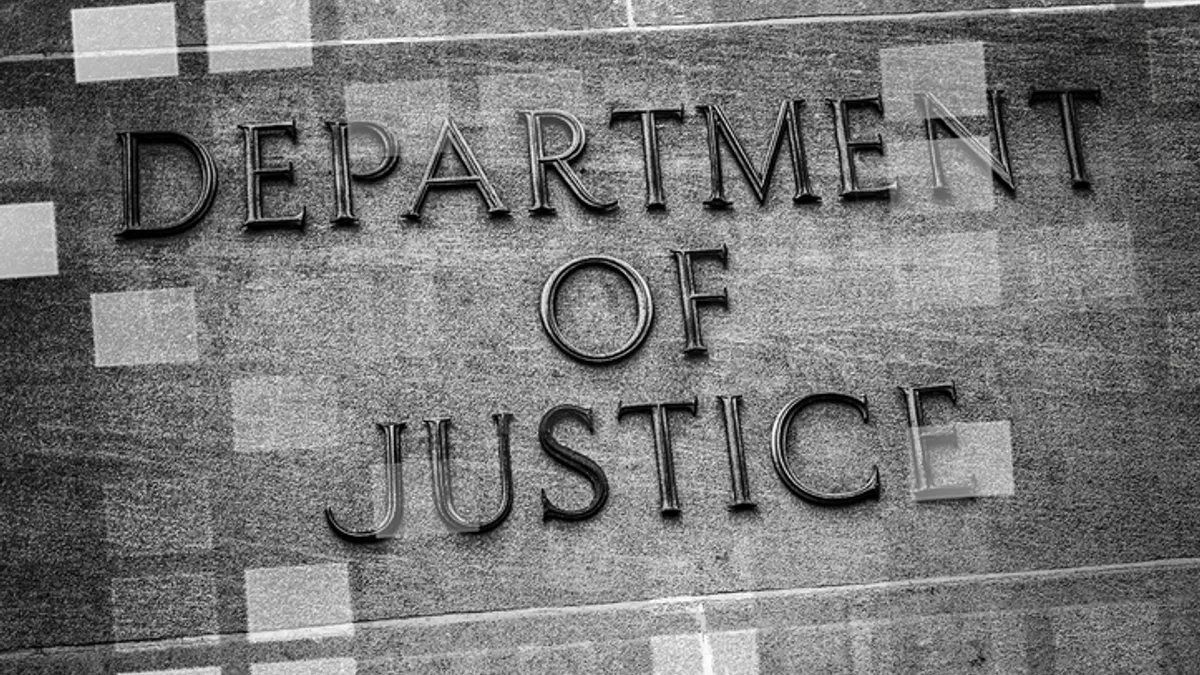Dive Brief:
- Federal antitrust enforcement would be taken away from the Federal Trade Commission and handed over to the Department of Justice, which currently shares the duty with the FTC, in a bill introduced in the House of Representatives Jan. 14 by Rep. Ben Cline (R-Va.).
- Cline introduced the bill last year but it went nowhere after it was reported out of the Judiciary Committee, but this time the outcome might be different.
- “President-elect Trump’s new ‘Department of Government Efficiency’ has been tasked with providing advice and guidance on reducing government waste and restructuring federal agencies,” former FTC General Counsel Alden Abbot says in an article he wrote for Forbes. This is “one act of restructuring that may warrant consideration.” DOGE is a presidential advisory committee headed up by Tesla CEO Elon Musk and tech entrepreneur Vivek Ramaswamy.
Dive Insight:
DOJ is the country’s original antitrust enforcer. Congress gave it that authority under the Sherman Antitrust Act of 1890, then added the Federal Trade Commission to the mix in 1914 with passage of the FTC Act, which gave it authority to bring civil cases against companies for engaging in unfair methods of competition. DOJ can bring criminal cases against companies.
The agencies have since developed a clearance process in which they decide who will look into what deal when companies submit proposed mergers to the agencies under the 30-day Hart-Scott-Rodino pre-merger review process.
Although there are some deals that DOJ alone can handle from an antitrust perspective because of statutory restrictions on the FTC — banks and common carriers like airlines are two of the big ones — the two agencies mostly have flexibility in which one initiates a case when it sees a potential anticompetitive deal, according to an analysis by the Government Accountability Office.
“While one agency may have developed expertise in a particular industry or market, it does not preclude the other agency from requesting to review a transaction that the other agency has developed expertise in,” the GAO says in the analysis, which Congress asked it to undertake in 2023.
In announcing his re-introduction of the bill, Rep. Cline called this lack of hard jurisdiction a recipe for conflict that slows reviews and increases costs, among other things.
“Antitrust enforcement has been plagued by bureaucratic infighting and delays that hinder competition,” Cline said.
Antitrust specialists say it can also lead to uneven enforcement, with the FTC using lower standards to identify anticompetitive conduct than what DOJ uses.
“The FTC would no longer be able to challenge mergers based on a different, and somewhat lower, standard than the DOJ,” Jon Dubrow, U.S. head of the antitrust group at McDermott Will & Emery, said in an email to Legal Dive.
The flip side of this is the loss of independent, bi-partisan oversight the FTC brings to enforcement, says David Cross, a partner in Goodwin’s antitrust and competition practice. The FTC is comprised of five commissioners, of which no more than three can be from one political party, and they each can serve for seven years without being removed except for cause.
“Consumers arguably benefit from the diverse perspectives of a bi-partisan commission,” Cross told Legal Dive. “It also would significantly narrow the scope of competition enforcement since the FTC has broader authority than the DOJ, and that potentially could sideline federal authorities in the face of certain types of anticompetitive conduct.”
If it’s efficiency lawmakers are looking for, Cross said, they can get that from administrative changes. “The improvements needed with federal competition enforcement involve streamlining processes and fostering greater transparency, predictability, and accountability,” he said.
Contested clearances
In its analysis, GAO says there’s little infighting between the two agencies and only rarely is there conflict over enforcement.
“The number of contested clearances never rose above 5.5% of transactions,” the agency says based on a 20-year analysis of HSR reviews, and that high-water mark occurred only once, in 2003. In the last four years of its study period, fewer than 1% of reviews were contested, it said.
Separate from these merger review conflicts, there were only two cases in which the two agencies differed on policy, including broader competition policy, with DOJ in those cases saying the FTC erred in its assessment of anticompetitive effects.
The better-known of these cases was in 2019, when DOJ submitted a brief in FTC v. Qualcomm questioning the legal basis for the FTC to sue the company for what it called anticompetitive tactics in the market for a semiconductor device used in cell phones. The 9th Circuit Court of Appeals agreed with DOJ and ruled against the FTC and in favor of the company.
In his article, Abbott said GAO missed the bigger picture in its analysis. Its positive assessment about contested reviews, he said, “was based on formal decisions escalated to agency leadership, and did not account for serious staff level delays.”
Abbott said the overlapping authority isn’t just about inefficiency; it’s about giving companies clear standards and processes to follow, because if companies stand to face an enforcement regime under one agency that’s different than that of another, the rule of law suffers.
“This inconsistency treats defendant firms unequally and thus is in tension with the rule of law,” he said, referring to the different procedural steps one agency uses compared to the other agency.
Without coming down one way or the other on the merits of handing all enforcement to DOJ, Dubrow said such a change could at least reduce clearance battles between the two agencies, which would speed up the process.
“In some cases … substantive review does not start until late in the 30-day HSR waiting period,” Dubrow said.











